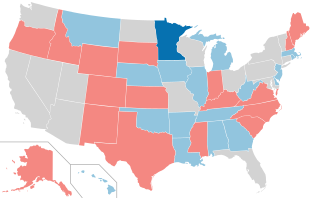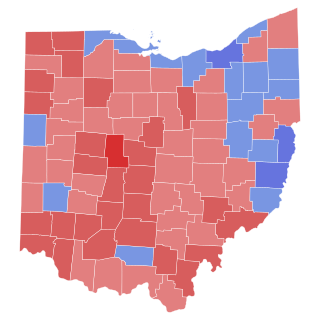Related Research Articles

Peter John Visclosky is an American politician who served as the U.S. representative for Indiana's 1st congressional district from 1985 until his retirement in 2021. He is a member of the Democratic Party and was the dean of the Indiana congressional delegation before his retirement in 2021. The District lies in Northwest Indiana,and includes most of the Indiana side of the Chicago metropolitan area. Redistricting passed by the Indiana General Assembly in 2011 changed the district's boundaries,effective January 2013,to include all of Lake and Porter counties as well as the western and northwestern townships of LaPorte County,while shifting Benton,Newton,and Jasper counties out of the district.

The 1990 United States Senate elections were held on Tuesday,November 6,1990,with the 33 seats of Class 2 contested in regular elections. Special elections were also held to fill vacancies. The Democratic Party increased its majority with a net gain of one seat from the Republican Party. The election cycle took place in the middle of President George H. W. Bush's term,and,as with most other midterm elections,the party not holding the presidency gained seats in Congress.

The 1988 United States Senate elections were elections for the United States Senate. Held on November 8,the 33 seats of Class 1 were contested in regular elections. In spite of the Republican victory by George H. W. Bush in the presidential election,the Democrats gained a net of one seat in the Senate. Seven seats changed parties,with four incumbents being defeated. The Democratic majority in the Senate increased by one to 55–to–45.

The 1986 United States Senate elections were elections for the United States Senate. Held on November 4,in the middle of Ronald Reagan's second presidential term,the 34 seats of Class 3 were contested in regular elections. The Republicans had to defend an unusually large number of freshman Senate incumbents who had been elected on President Ronald Reagan's coattails in 1980. Democrats won a net of eight seats,defeating seven freshman incumbents,picking up two Republican-held open seats,and regaining control of the Senate for the first time since January 1981. This remains the most recent midterm election cycle in which the sitting president's party suffered net losses while still flipping a Senate seat.

The 1978 United States Senate elections were held on November 7,in the middle of Democratic President Jimmy Carter's term. The 33 seats of Class 2 were contested in regular elections. Special elections were also held to fill vacancies.

The 1976 United States Senate elections was an election for the United States Senate. Held on November 2,the 33 seats of Class 1 were contested in regular elections. They coincided with Democrat Jimmy Carter's presidential election and the United States Bicentennial celebration. Although almost half of the seats decided in this election changed parties,Carter's narrow victory did not provide coattails for the Democratic Party. Each party flipped seven Senate seats,although,one of the seats flipped by Democrats was previously held by a Conservative.

The 1964 United States Senate elections were held on November 3. The 33 seats of Class 1 were contested in regular elections. Special elections were also held to fill vacancies. They coincided with the election of President Lyndon B. Johnson by an overwhelming majority,to a full term. His Democratic Party picked up a net two seats from the Republicans. As of 2023,this was the last time either party has had a two-thirds majority in the Senate,which allowed the Senate Democrats to override a veto,propose constitutional amendments,or convict and expel certain officials without any votes from Senate Republicans. However,internal divisions would have prevented the Democrats from having done so. The Senate election cycle coincided with Democratic gains in the House in the same year.

The 1958 United States Senate elections were elections for the United States Senate which occurred in the middle of President Dwight D. Eisenhower's second term. Thirty-two seats of Class 1 were contested in regular elections,the new state of Alaska held its first Senate elections for its Class 2 and 3 seats,and two special elections were held to fill vacancies.

The 1952 United States Senate elections was an election for the United States Senate which coincided with the election of Dwight D. Eisenhower to the presidency by a large margin. The 32 Senate seats of Class 1 were contested in regular elections,and three special elections were held to fill vacancies. The Republicans took control of the Senate by managing to make a net gain of two seats. However,Wayne Morse (R-OR) became an independent forcing Republicans to rely on Vice President Richard Nixon's tie-breaking vote,although Republicans maintained a 48–47–1 plurality. Throughout the next Congress,Republicans were able to restore their 49–46–1 majority. This was the third time,as well as second consecutive,in which a sitting Senate leader lost his seat.

Donald Allen Bailey was an American lawyer and politician from Pennsylvania. He was a Democratic member of the United States House of Representatives from 1979 to 1983,Auditor General of Pennsylvania from 1985 to 1989,and a candidate for the Democratic nomination for United States Senate and Governor of Pennsylvania. His Congressional District (PA-21) included all of Westmoreland County,Pennsylvania with a sliver of Allegheny County,Pennsylvania,prior to the 1981 redistricting.

Electoral history of Richard Lugar,United States Senator from Indiana (1977–2013),44th Mayor of Indianapolis (1968–1976),Chairman of the Senate Committees on Foreign Relations,Agriculture and a candidate for the 1996 Republican presidential nomination.
A Massachusetts general election was held on November 6,1990 in the Commonwealth of Massachusetts.

Pamela Lynn Carter is an American lawyer,politician,and business executive. She was the first black woman to serve as a state's attorney general. She served as Indiana Attorney General from 1993 to 1997.

Joseph Hadden Hogsett is an American attorney,prosecutor,and politician who is the 49th mayor of Indianapolis,Indiana. Prior to being elected,Hogsett served as the Secretary of State of Indiana from 1989 to 1994 and as the Chairman of the Indiana Democratic Party from 2003 to 2004. He was the Democratic nominee for the U.S. Senate in 1992,for Indiana's 2nd congressional district in 1994 and for Attorney General of Indiana in 2004. He most recently served as the United States attorney for the Southern District of Indiana from 2010 to 2014. On November 3,2015,he won the race for Mayor of Indianapolis in the 2015 election. He won reelection to a second term in 2019. In 2023,he won reelection to a third term in office.

The 1958 United States Senate elections in Alaska were held November 25,1958. The elections were held in anticipation of Alaska's admission as the forty-ninth state in the union,effective January 3,1959. The state held two simultaneous elections to determine their first senators.

The 1988 Indiana gubernatorial election was held on November 8,1988,in all 92 counties in the state of Indiana. Incumbent Governor Robert D. Orr,a Republican,was ineligible to run for a third consecutive term due to term limits established by the Indiana Constitution. In the general election,the Republican nominee,Lieutenant Governor John Mutz,was defeated by Democrat Indiana Secretary of State Evan Bayh by a margin of six percentage points. Bayh was the first Democrat to be elected Governor of Indiana since Roger D. Branigin's victory during the 1964 Democratic landslides twenty-four years previously.

The 1968 United States Senate election in Ohio took place on November 5,1968. Incumbent Senator Frank Lausche ran for re-election to a third term,but lost the Democratic primary to former U.S. Representative John J. Gilligan. Before losing the primary to the more solidly liberal Gilligan,Lausche had one of the most conservative voting record among Senate Democrats outside of The South,leaving the Democratic Party very disappointed. In the general election,Gilligan lost to Republican Ohio Attorney General William Saxbe in a close race. Saxbe's victory increased the number of Senate Republicans in the 91st Congress. He would serve 5 years in the Senate before being nominated by President Richard Nixon to be U.S Attorney General,he resigned the seat after being confirmed. Gilligan,who in January 1974 was serving as the Governor of Ohio,named Saxbe's successor.

The 1984 Indiana gubernatorial election was held on November 6,1984,in all 92 counties of Indiana. Robert D. Orr,the state's incumbent Republican governor,who defeated former State Treasurer John Snyder for the nomination,was comfortably reelected to a second term,defeating State Senator Wayne Townsend and two minor party challengers in the general election. His victory marked the fifth consecutive victory for the Republican Party in Indiana gubernatorial elections,and the last time Republicans would win the governorship in the 20th century.

The 2020 Indiana gubernatorial election was won by incumbent Republican Eric Holcomb on November 3,2020. The election was held concurrently with the 2020 U.S. presidential election,as well as elections to the United States House of Representatives and various state and local elections.

The Cook County,Illinois,general election was held on November 6,1990.
References
- ↑ "Offices". March 3, 2015.
- ↑ Carden, Dan (July 21, 2015). "Carter eyes return as Indiana attorney general". nwitimes.com. Retrieved 5 February 2019.
- 1 2 3 "Former attorney general seeks old office". March 11, 2016.
- 1 2 3 4 5 6 "Attorney general candidate is a pleasant surprise". Kokomo Tribune. 11 February 2000.
- ↑ "Incumbent faces tough test after short term". Kokomo Tribune. October 30, 2000.
- ↑ Bernard, Zach. "Former Indiana AG Carter Returns To Republican Race". www.wboi.org.
- ↑ "Indiana GOP pick nominees for Attorney General and State School Superintendent". June 11, 2016.
- ↑ "Hill, McCormick win Republican nominations". Indianapolis Star.
- ↑ "Our Campaigns - IN Attorney General Race - Nov 05, 1996". www.ourcampaigns.com.
- ↑ "Our Campaigns - IN Attorney General Race - Nov 07, 2000". www.ourcampaigns.com.
- ↑ "Our Campaigns - IN Attorney General Race - Nov 02, 2004". www.ourcampaigns.com.
